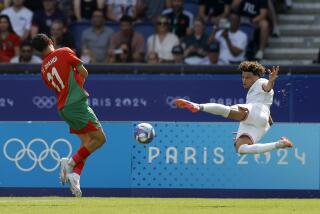It’s Not in the Cards: U.S. Is Ousted, 2-1 : World Cup: Match against Austria becomes a street fight as Americans suffer third consecutive loss. But the winner might not advance, either.
- Share via
FLORENCE, Italy — When soccer is played with grace and style, it is a sport befitting the beauty of this Renaissance city. When it is played with the lack of discipline that the United States and Austria displayed Tuesday night, it is as if someone took an ax to a Botticelli painting.
Austria won, 2-1, scoring both goals in the second half while fielding only 10 men because one player was sent off in the 33rd minute for a tackle that could only have been intended to injure U.S. forward Peter Vermes.
But well before that, the game deteriorated into a rumble before an announced crowd of 34,857 at Communale Stadium.
The United States gave almost as much as it got. Besides the one red card, and accompanying ejection, given to Austria’s Peter Artner, there were nine yellow warning cards for flagrant fouls.
No referee in the tournament has had to reach into his pocket for a card as often as Syria’s Jamal Al Sharif. Before the 90 minutes expired, he had yellow-carded five Austrians and four Americans.
The United States leaves the tournament, having made this World Cup appearance far less memorable than its last one in 1950. Forty years ago in Brazil, the U.S. side upset England, 1-0. It was eliminated in this one after going winless in three first-round games. The closest it came to another major upset was a 1-0 loss to Italy last Thursday in Rome.
It did not play nearly as well in the loss to Austria, but U.S. Coach Bob Gansler said he believes his squad proved it belonged among the 24 teams.
“Obviously, we’re disappointed with the result tonight,” he said. “We felt we had the ability to beat Austria.
“But we proved in the second and third games that perhaps the difference between the nations that are in the World Cup perpetually and the rest of us might not be as great as some believe.”
If there is any other consolation, the United States might also have eliminated Austria. After 1-0 losses to Italy and Czechoslovakia in its first two games, Austria needed at least a two-goal victory to have a better-than-even chance of advancing as a wild-card team to the 16-team second round.
After a scoreless first half, the Austrians got the two goals they needed in the first 18 minutes of the second half.
That was as disheartening as anything that happened to the U.S. side in its nightmarish 5-1 opening loss to Czechoslovakia. Not only did the United States have a man advantage, but Austria’s star striker, Toni Polster, was on the bench because Coach Josef Hickersberger thought his team needed more active players.
Were they ever. On one of only three corner kicks the United States took in the game, Austrian forward Andreas Ogris reacted quickly to a ball that defender Desmond Armstrong and midfielder Jimmy Banks let fall between them, and ran even more quickly down the left sideline.
Although sweeper Mike Windischmann had the angle on him, Ogris went past him as though he were invisible, then beat goalkeeper Tony Meola with a right-footed shot into the right corner of the net in the 49th minute.
“It was miscommunication,” Banks said of the crucial mistake that set up the goal. “Desmond thought I had it, and I thought he had it. It was just a mental mistake.”
As in the game against Czechoslovakia, the United States lost its composure after falling behind.
The Austrians scored again 14 minutes later when Michael Streiter centered a pass in the penalty area to Gerhard Rodax, who, unmarked by either Armstrong or Windischmann, right-footed a shot past Meola.
“There was a lack of patience after that shocking first goal,” Gansler said, citing the defensive lapses.
His pregame strategy was virtually the same as it was against Italy: Build a moat around the goal and counter-attack when presented with the opportunity. But Austria’s second goal forced the United States to attack, an uncomfortable situation for a slow, technically deficient team.
One goal down, Gansler already had replaced Banks with an offensive midfielder, Eric Wynalda. After the second goal, another offensive midfielder, Brian Bliss, entered the game in place of Paul Caligiuri.
For the final 20 minutes, the United States had the tiring Austrians on their heels. They finally broke in the 83rd minute when midfielder Tab Ramos, the United States’ most impressive player in the tournament, made a move around defender Ernest Aigner in the penalty area and passed to forward Bruce Murray, who scored with a right-footed shot that slipped through the hands of goalkeeper Klaus Lindenberger.
Otherwise, Murray will not have particularly fond memories of this game. Looking like Henry Tillman against Mike Tyson early in the game and seeing his teammates take more of the same, Murray set himself up as the team’s enforcer.
After defender Robert Pecl took him down in the 32nd minute with a hard tackle that resulted in a yellow card, Murray waited until the referee turned his back, then belted the Austrian in the face.
Murray almost got away with another flagrant foul nine minutes later when he took Pecl down with a move that would have been more appropriate at Wrestlemania.
The referee did not see this one, either. But as Austria’s medical staff went onto the field to attend to Pecl, the linesman recounted the details of the foul to Sharif, who gave Murray a yellow card. It easily could have been a red.
Asked if the game was as rough on the field as it looked from the stands, Armstrong said: “Ask Bruce. He got two right hooks to the eye. As the game went along, he got the guy back. You have to do that. If you don’t retaliate, the guy’s got you in his back pocket.”
Defensive midfielder Marcelo Balboa said it was one of the roughest games he has ever played. But he said Austria started it.
“We had to show them we could take it,” he said. “If they’re going to hurt one of our guys, we’re going to hurt one of theirs.”
Proving that the view from the sidelines is one of the worst in sports, both coaches accused Sharif of overreacting.
“I thought he was too harsh,” Hickersberger said. “Normally, I have nothing to say to a referee, but I must make an exception today.”
Gansler also betrayed his usual reticence about the officiating.
“I believe I’ve seen more bad-spirited games than the one today,” he said. “We had a nervous gentleman in the middle who didn’t get a grip on the game early, and subsequently, it became a card parade.”
If indeed Sharif was a gentleman, he might have been the only one on the field.
GROUP STANDINGS C6
OTHER MATCHES C7






